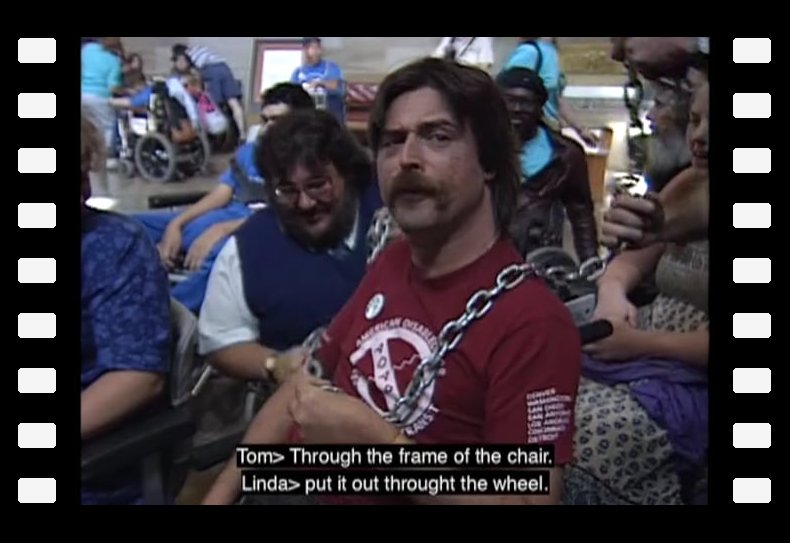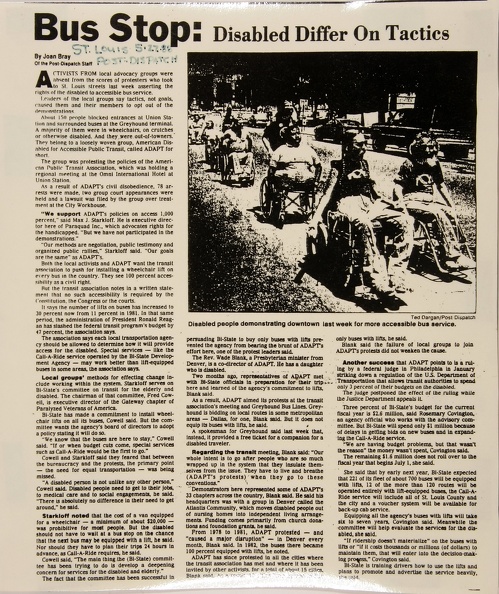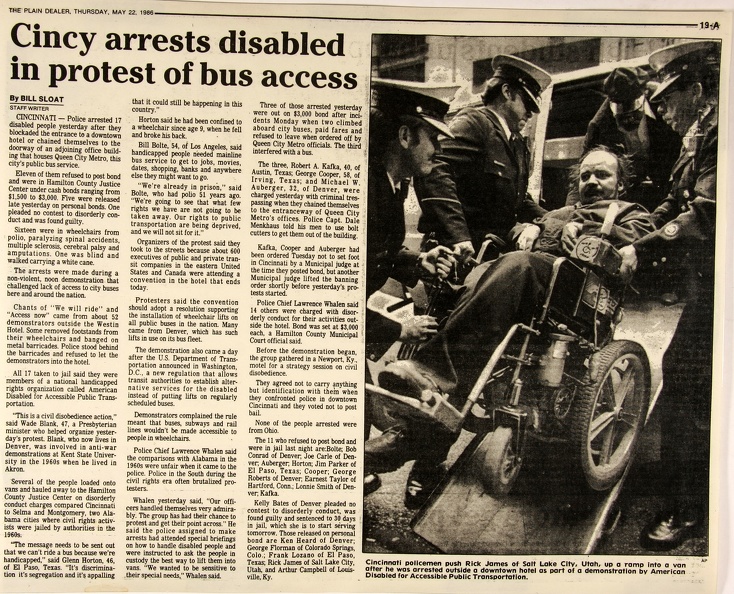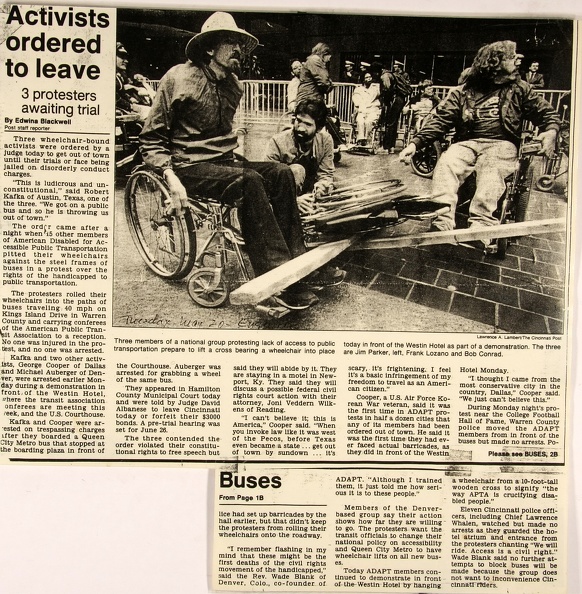- LanguageAfrikaans Argentina AzÉrbaycanca
á¥áá áá£áá Äesky Ãslenska
áá¶áá¶ááááá à¤à¥à¤à¤à¤£à¥ বাà¦à¦²à¦¾
தமிழ௠à²à²¨à³à²¨à²¡ ภาษาà¹à¸à¸¢
ä¸æ (ç¹é«) ä¸æ (é¦æ¸¯) Bahasa Indonesia
Brasil Brezhoneg CatalÃ
ç®ä½ä¸æ Dansk Deutsch
Dhivehi English English
English Español Esperanto
Estonian Finnish Français
Français Gaeilge Galego
Hrvatski Italiano Îλληνικά
íêµì´ LatvieÅ¡u Lëtzebuergesch
Lietuviu Magyar Malay
Nederlands Norwegian nynorsk Norwegian
Polski Português RomânÄ
Slovenšcina Slovensky Srpski
Svenska Türkçe Tiếng Viá»t
Ù¾Ø§Ø±Ø³Û æ¥æ¬èª ÐÑлгаÑÑки
ÐакедонÑки Ðонгол Ð ÑÑÑкий
СÑпÑки УкÑаÑнÑÑка ×¢×ר×ת
اÙعربÙØ© اÙعربÙØ©
Home / Albums / Tags Wade Blank + Frank Lozano
+ Frank Lozano + Bob Kafka
+ Bob Kafka 4
4

 US_Capitol_Rotunda_part_2_cap
US_Capitol_Rotunda_part_2_cap
This is part 2 of the ADAPT Capitol Rotunda protest in support of the Americans with Disabilities Act, ADA. This shows the group preparing for civil disobedience to pressure swift passage of the bill. Over 100 people were arrested at this protest, which gets less attention than the Crawl but was equally intense. The film is open captioned (as are all videos on this museum site). ADAPT (395)
ADAPT (395)
St. Louis Post Dispatch 5-22-88 PHOTO by Ted Dargan/Post Dispatch: A Line of ADAPT people roll down a city street. The first person in line (Mike Auberger) has two long braids and sunglasses. His arms hang on either side of his motorized wheelchair and his ADAPT shirt is somewhat covered by the chest strap on his chair. Next to Mike is a man in a manual wheelchair with curly hair and a beard (Bob Kafka) who has is legs crossed and is wearing the same ADAPT shirt as Mike. Behind them a man (Jerry Eubanks) with no legs in a manual wheelchair is being pushed by a blind man (Frank Lozano) who is smiling. Behind them is another man in a maual wheelchair. Behind him is someone in a motorized wheelchair who is looking off to the side. Behind them is another person in a wheelchair. The photo is grainy so it's hard to make out many details. Caption reads: Disabled people demonstrating downtown last week for more accessible bus service. Title: Bus Stop By Joan Bray Of the Post-Dispatch Staff ACTIV1STS FROM local advocacy groups were absent from the scores of protesters who took to St. Louis streets last week asserting the rights of the disabled to accessible bus service. Leaders of the local groups say tactics, not goals, caused them and their members to opt out of the demonstrations. About 150 people blocked entrances at Union Station and surrounded buses at the Greyhound terminal. A majority of them were in wheelchairs, on crutches or otherwise disabled. And they were out-of-towners. They belong to a loosely woven group, American Disabled for Accessible Public Transit, called ADAPT for short. The group was protesting the policies of the American Public Transit Association, which was holding a regional meeting at the Omni International Hotel at Union Station. As a result of ADAPT's civil disobedience, 78 arrests were made, two group court appearances were held and a lawsuit was filed by the group over treatment at the City Workhouse. We support ADAPT's policies on access 1,000 percent," said Max J. Starkloff. He is executive director here of Paraquad Inc., which advocates rights for the handicapped. "But we have not participated in the demonstrations." "Our methods are negotiation, public testimony and organized public rallies," Starkloff said. "Our goals ore the same" as ADAPT's. Both the local activists and ADAPT want the transit association to push for installing a wheelchair lift on every bus in the country. They see 100 percent accessibility as a civil right. Rut the transit association notes in a written statement that no such accessibility is required by the Constitution, the Congress or the courts. It says the number of lifts on buses has increased to 30 percent now from 11 percent in 1981. In that same period, the administration of President Ronald Reagan has slashed the federal transit program's budget by 47 percent, the association says. The association says each local transportation agency should be allowed to determine how it will provide access for the disabled. Special services — like the Call-A-Ride service operated by the Bi-State Development Agency — may work better than lift-equipped buses in some areas, the association says. Local groups' methods for effecting change include working within the system. Starkloff serves on Bi-State's committee on transit for the elderly and disabled. The chairman of that committee, Fred Cowell, is executive director of the Gateway chapter of Paralyzed Veterans of America. Bi-State has made a commitment to install wheelchair lifts on all its buses, Cowell said. But the committee wants the agency's board of directors to adopt a policy stating it will do so. "We know that the buses are here to stay," Cowell said. "If or when budget cuts come, special services such as Call-A-Ride would be the first to go." Cowell and Starkloff said they feared that between the bureaucracy and the protests, the primary point — the need for equal transportation — was being missed. "A disabled person is not unlike any other person," Cowell said. Disabled people need to get to their jobs, to medical care and to social engagements, be said. "There is absolutely no difference in their need to get around," he said. Starkloff noted that the cost of a van equipped for a wheelchair — a minimum of about $20,000 — was prohibitive for most people. But the disabled should not have to wait at a bus stop on the chance that the next bus may be equipped with a lift, be said. Nor should they have to plan their trips 24 hours in advance, as Call-A-Ride requires, he said. Cowell said, "The main thing the (BI-State) committee has been trying to do is develop a deepening concern for services for the disabled and elderly." The fact that the committee has been successful in persuading Bi-State to buy only buses with lifts prevented the agency from bearing the brunt of ADAPT's effort here, one of the protest leaders said. The Rev. Wade Blank, a Presbyterian minister from Denver, is a co-director of ADAPT. He has a daughter who is disabled. Two months ago, representatives of ADAPT met with State officials in preparation for their trip here and learned of the agency's commitment to lifts, Blank said. As a result, ADAPT aimed its protests at the transit association's meeting and Greyhound Bus Lines. Greyhound is bidding on local routes in some metropolitan areas — Dallas, for one, Blank said. But it does not equip its buses with lifts, he said. A spokesman for Greyhound said last week that, instead, it provided a free ticket for a companion for a disabled traveler. Regarding the transit meeting, Blank said: "Our whole intent is to go after people who are so much wrapped up in the system that they insulate themselves from the issue. They have to live and breathe (ADAPT's protests) when they go to these conventions." Demonstrators here represented some of ADAPTs 33 chapters across the country, Blank said. He said his headquarters was with a group in Denver called the Atlantis Community, which moves disabled people out of nursing homes into independent living arrangements. Funding comes primarily from church donations and foundation grants, he said. From 1978 to 1981, ADAPT protested — and "caused a major disruption" — in Denver every month, Blank said. In 1982, the buses there became 100 percent equipped with lifts, he noted. ADAPT has since protested in all the cities where the transit association has met and where it has been invited by other activists, for a total of about 15 cities, Blank said. [unreadable] ...only buses with lifts, he said. Blank said the failure of local groups to join ADAPT's protests did not weaken the cause. Another success that ADAPT points to is a ruling by a federal Judge in Philadelphia in January striking down a regulation of the US. Department of Transportation that allows transit authorities to spend only 3 percent of their budgets on the disabled. The Judge postponed the effect of the ruling while the Justice Department appeals it. Three percent of Bi-State's budget for the current fiscal year Is $2.6 million, said Rosemary Covington, an agency official who works with the advisory committee. But Bi-State will spend only $1 million because of delays in getting bids on new buses and in expanding the Call-A-Ride service. "We are having budget problems, but that wasn't the reason" the money wasn't spent, Covington said. The remaining $1.6 million does not roll over to the fiscal year that begins July 1, she said. She said that by early next year, Bi-State expected that 221 of its fleet of about 700 buses will be equipped with lifts, 12 of the more than 120 routes will be operated entirely with lift-equipped buses, the Call-A-Ride service will include all of St. Louis County and the city and a voucher system will be available for back-up cab service. Equipping all the agency's buses with lifts will take six to seven years, Covington said. Meanwhile the committee will help evaluate the services for the disabled, she said. "If ridership doesn't materialize" on the buses with lifts or "if it costs thousands or millions (of dollars) to maintain them, that will enter into the decision making," Covington said. Bi-State is training drivers how to use the lifts and plans to promote and advertise the service heavily, she said. ADAPT (267)
ADAPT (267)
THE PLAIN DEALER, THURSDAY, MAY 22; 1986 page 19-A PHOTO by AP: Four policemen in their fancy police hats are "rolling" a man (Rick James) up a 150 degree (ie. almost vertical) "ramp" into a van. Rick is sitting with his hands up by his chest. His hat is missing and his hair is flying out in all directions. His expression is a mix of amazement, disgust and resignation. Caption reads: Cincinnati policemen push Rick James of Salt Lake City, Utah, up a ramp into a van after he was arrested outside a downtown hotel as part of a demonstration by American Disabled for Accessible Public Transportation. Title: Cincy arrests disabled in protest of bus access By BILL SLOAT STAFF writer CINCINNATI — Police arrested l7 disabled people yesterday after they blockaded the entrance to a downtown hotel or chained themselves to the doorway of an adjoining office building that houses Queen City Metro, this city’s public bus service. Eleven of them refused to post bond and were in Hamilton County Justice Center under cash bonds ranging from $1,500 to $3,000. Five were released late yesterday on personal bonds. One pleaded no contest to disorderly conduct and was found guilty. Sixteen were in wheelchairs from polio, paralyzing spinal accidents, multiple sclerosis, cerebral palsy and amputations. One was blind and walked carrying a white cane. The arrests were made during a non-violent, noon demonstration that challenged lack of access to city buses here and around the nation. Chants of “We will ride" and “Access now” came from about 52 demonstrators outside the Westin Hotel. Some removed footstands from their wheelchairs and banged on metal barricades. Police stood behind the barricades and refused to let the demonstrators into the hotel. All 17 taken to jail said they were members of a national handicapped rights organization called American Disabled for Accessible Public Transportation. “This is a civil disobedience action," said Wade Blank, 47, a Presbyterian minister who helped organize yesterday's protest. Blank, who now lives in Denver, was involved in anti-war demonstrations at Kent State University in the 1960s when he lived in Akron. Several of the people loaded onto vans and hauled away to the Hamilton County Justice Center on disorderly conduct charges compared Cincinnati to Selma and Montgomery, two Alabama cities where civil rights activists were jailed by authorities in the 1960s. “The message needs to be sent out that we can’t ride a bus because we're handicapped,” said Glenn Horton, 46, of El Paso, Texas. "It's discrimination it’s segregation and it’s appalling that it could still be happening in this country." Horton said he had been confined to a wheelchair since age 9, when he fell and broke his back. Bill Bolte, 54, of Los Angeles, said handicapped people needed mainline bus service to get to jobs, movies, dates, shopping, banks and anywhere else they might want to go. “We're already in prison," said Bolte, who had polio 51 years ago. “We're going to see that what few rights we have are not going to be taken away. Our rights to public transportation are being deprived, and we will not sit for it." Organizers of the protest said they took to the streets because about 600 executives of public and private transit companies in the eastern United States and Canada were attending a convention in the hotel that ends today. Protesters said the convention should adopt a resolution supporting the installation of wheelchair lifts on all public buses in the nation. Many came from Denver, which has such lifts in use on its bus fleet. The demonstration also came a day after the U.S. Department of Transportation announced in Washington, D.C., a new regulation that allows transit authorities to establish alternative services for the disabled instead of putting lifts on regularly scheduled buses. Demonstrators complained the rule meant that buses, subways and rail lines wouldn't be made accessible to people in wheelchairs. Police Chief Lawrence Whalen said the comparisons with Alabama in the 1960s were unfair when it came to the police. Police in the South during the civil rights era often brutalized protesters. Whalen yesterday said, “Our officers handled themselves very admirably. The group has had their chance to protest and get their point across." He said the police assigned to make arrests had attended special briefings on how to handle disabled people and were instructed to ask the people in custody the best way to lift them into vans. “We wanted to be sensitive to their special needs." Whalen said. Three of those arrested yesterday were out on $3,000 bond after incidents Monday when two climbed aboard city buses, paid fares and refused to leave when ordered off by Queen City Metro officials. The third interfered with a bus. The three, Robert A. Kafka, 40, of Austin, Texas; George Cooper, 58, of Irving, Texas; and Michael W. Auberger, 32, of Denver, were charged yesterday with Criminal trespassing when they chained themselves to the entranceway of Queen City Metro's offices. Police Capt. Dale Menkhaus told his men to use bolt cutters to get them out of the building. Kafka, Cooper and Auberger had been ordered Tuesday not to set foot in Cincinnati by a Municipal judge at the time they posted bond, but another Municipal judge lifted the banning order shortly before yesterday's protests started. Police Chief Lawrence Whalen said 14 others were charged with disorderly conduct for their activities outside the hotel. Bond was set at $3,000 each, a Hamilton County Municipal Court official said. Before the demonstration began, the group gathered in a Newport, Ky., motel for a strategy session on civil disobedience. They agreed not to carry anything but identification with them when they confronted police in downtown Cincinnati and they voted not to post bail. None of the people arrested were from Ohio. The 11 who refused to post bond and were in jail last night are: Bolte; Bob Conrad of Denver; Joe Carle of Denver; Auberger; Horton; Jim Parker of El Paso, Texas; Cooper; George Roberts of Denver; Earnest Taylor of Hartford, Conn.; Lonnie Smith of Denver; Kafka. Kelly Bates of Denver pleaded no contest to disorderly conduct, was found guilty and sentenced to 30 days in jail, which she is to start serving tomorrow. Those released on personal bond are Ken Heard of Denver; George Florman of Colorado Springs, Colo.; Frank Lozano of El Paso, Texas; Rick James of Salt Lake City, Utah; and Arthur Campbell of Louisville, Ky. ADAPT (253)
ADAPT (253)
The Cincinnati Post Tuesday May 20 - Photo by Lawrence A. Lambert/The Cincinnati Post: A man (Jim Parker) in a big straw hat and a manual wheelchair sits holding a wooden structure on his feet. Beside him, on his left, a man with dark hair and a dark beard (Frank Lozano) kneels, attaching a folded manual wheelchair to the crossed wood. To his left, another man (Bob Conrad) in a power chair a jacket and an ADAPT shirt, with the access symbol and an equal sign in the wheel, points at what Frank is doing and looks off to his right. Over Bob's right shoulder you can see Bobby Simpson and an African American woman (Gwen Hubbard?) up against some police barriers; the woman is talking with someone. To their right and over Frank's head you can see another man in a wheelchair watching as a woman stands beside him. Over Jim's shoulder you can see another protester in a wheelchair. In the background is the cavernous black of the hotel entrance which is blocked by metal barricades and guarded by police. caption reads: Three members of a national group protesting lack of access to public transportation prepare to lift a cross bearing a wheelchair into place today in from of the Westin Hotel as part of a demonstration. The three are Jim Parker, left, Frank Lozano and Bob Conrad. Title: Activists ordered to leave 3 protesters awaiting trial By Edwin: Blackwell, Post staff reporter Three wheelchair-bound activists were ordered by a judge today to get out of town until their trials or face being jailed on disorderly conduct charges. “This is ludicrous and unconstitutional," said Robert Kafka of Austin, Texas, one of the three. "We got on a public bus and so he is throwing us out of town." The order came after a night when 15 other members or American Disabled for Accessible Public Transportation pitted their wheelchairs against the steel frames of buses in a protest over the rights of the handicapped to public transportation. The protesters rolled their wheelchairs into the paths of buses traveling 40 mph on Kings Island Drive in Warren County and carrying conferees of the American Public Transit Association to a reception. No one was injured in the protest, and no one was arrested. Kafka and two other activists, George Cooper of Dallas and Michael Auberger of Denver, were arrested earlier Monday during a demonstration in front of the Westin Hotel, where the transit association conferees are meeting this week, and the U.S. Courthouse. Kafka and Cooper were arrested on trespassing charges after they boarded a Queen City Metro bus that stopped at the boarding plaza in front of the Courthouse. Auberger was arrested for grabbing a wheel of the same bus. They appeared in Hamilton County Municipal Court today and were told by Judge David Albanese to leave Cincinnati today or forfeit their $3000 bonds. A pre-trial hearing was set for June 26. The three contended the order violated their constitutional rights to free speech but said they will abide by it. They are staying in a motel in Newport, Ky. They said they will discuss possible federal civil rights court action with their attorney, Joni Veddern Wilkens of Reading. "I can’t believe it; this is America," Cooper said. “When you invoke law like it was west of the Pecos, before Texas even became a state . .. get out of town by sundown ... it's scary, it's frightening. I feel it's a basic infringement of my freedom to travel as an American citizen." Cooper, a U.S. Air Force Korean Wax veteran, said it was the first time in ADAPT protests in half a dozen cities that any of its members had been ordered out of town. He said it was the first time they had ever faced actual barricades, as they did in front at the Westin Hotel Monday. “I thought I came from the most conservative city in the country, Dallas," Cooper said. "We just can't believe this." During Monday night's protest near the College Football Hall of Fame, Warren County police moved the ADAPT members from in front of the buses but made no arrests. Police had set up barricades by the hall earlier, but that didn't keep the protesters from roiling their wheelchairs onto the roadway. “I remember flashing in my mind that these might be the first deaths of the civil rights movement of the handicapped," said the Rev. Wade Blank of Denver, Colo., co-founder of ADAPT. “Although I trained them, it just told me how serious it is to these people." Members of the Denver based group say their action shows how far they are willing to go. The protesters want the transit officials to change their national policy on accessibility and Queen City Metro to have wheelchair lifts on all new buses. Today ADAPT members continued to demonstrate in front of the Westin Hotel by hanging a wheelchair from a 10-foot-tall wooden cross to signify “the way APTA is crucifying disabled people." Eleven Cincinnati police officers, including Chief Lawrence Whalen, watched but made no arrests as they guarded the hotel atrium and entrance from some protesters chanting “We will ride. Access is a civil right." Wade Blank said no further attempts to block buses will be made because the group does not want to inconvenience Cincinnati riders.